In Hot Stove #204, I expressed my hope that the four underdogs would win the National League Division Series (NLDS) and the American League Division Series (ALDS). In the NL, this meant San Diego and Philadelphia. In the AL, Seattle and Cleveland.
My primary motivation was that each of the underdogs had a long-suffering fan base that had not tasted postseason success for many years. In the AL, I had some extra motivation. I did not want wins for Houston (trash cans) or the damn Yankees.
On Saturday, I got my wish in the National League. Each NLDS series went four games of the best-of-five format, the winners going 3-1. The Padres over the Dodgers. The Phillies over the Braves.
One of the ALDS series also finished on Saturday, but that went the wrong way (for me). The Seattle Mariners were swept by the Houston Astros (3-0). It was closer than it looks, as will be detailed below in Seattle Stories.
As of games completed on Saturday, the brackets looked like this:
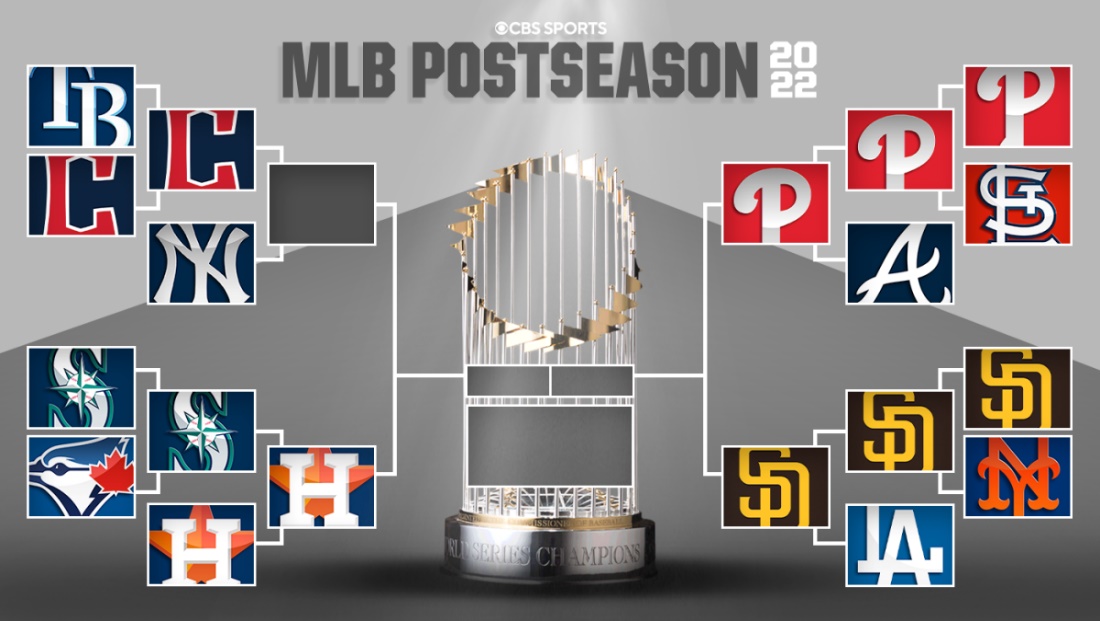
It would take three more days to fill in the blank for the Yankees/Guardians series. Two reasons. The series went five games. Rain.
Cleveland and New York split their first two games and met for Game 3 on Saturday. The Yankees were hoping that Aaron Judge would awaken – he had gone 0-8 in the first two games, striking out seven times. And he did just that with a two-run homer in the 3rd to tie the game 2-2. Two other Yankees homered and it looked like a typical Yankee win pattern as they led 5-3 in the bottom of the ninth.
But they were playing the “Guardiac Kids” – a nickname earned by the young team for many late-inning wins during the season. Created a new line of sporting goods for Cleveland fans.

In their half of the 9th, the Guardians played their signature small ball (five singles) to come back and win 6-5. Happy video here. It was reminiscent of the “Keep the line moving” mantra of the Royals in 2015.
Cool stat: The Yankees had previously been in 167 postseason games when they led by multiple runs in the 9th inning. They won all of them. They were now 167-1.
The Yankees came back to win Game 4 on Sunday, setting the stage for decisive Game 5 at Yankee Stadium on Monday, but…
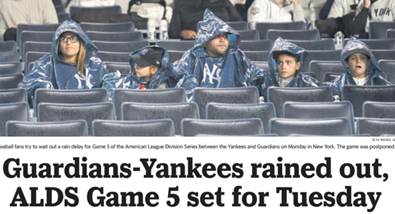
Tuesday’s Game 5 Summary: Guardiac Arrest. The Yankees scored three in the first on a walk, hit-by-pitch and a Giancarlo Stanton homer. Aaron Judge hit a homer in the 2nd to make it 4-0. Other than good pitching, little of consequence happened in the rest of the game. Final score, 5-1. Yankees are now 168-1 in postseason games when they lead by multiple runs in the 9th.
Cleveland will need to try again next year, the 75th anniversary of their last World Series victory (1948).
Lonnie’s Picks: For the National League Championship Series (NLCS), the American League Championship Series (ACLS) and the World Series.
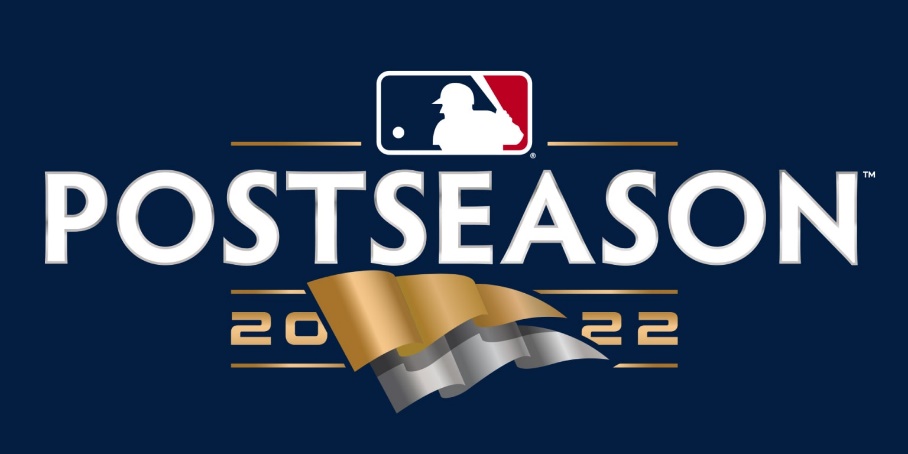
NLCS: San Diego over Philadelphia. The Padres, founded in 1969, have never won a World Series. It’s time, but last night in Game 1, the Padres got only one hit. The Phillies got only three, but two were solo home runs for a 2-0 win. Game 2 is today at 3:35. Go Padres.
ALCS: I don’t want either team to win. If pressed, I guess I would go with the Yankees over the trash can Astros. Game 1 is tonight at 6:37. The Astros have been resting for three days. The Yankees will be playing their third game in four days in three different stadiums.
World Series: My pick is the NLCS winner over the ALCS winner.
Playoff Format and Payrolls – The Money Factor: There are some complaints that the new playoff format has further diminished the importance of the regular season. The number of playoff teams was increased from 10 to 12, and the Wild Card round moved from a single elimination game to best-of-three games.
Exhibit #1: The top four National League teams in the regular season were Los Angeles (111-51), Atlanta (101-61), New York (101-61) and St. Louis (93-69). All four were eliminated in the first two rounds of the postseason.
The winners who moved on to the NLCS: San Diego Padres (89-73) v. Philadelphia Phillies (87-75).
Exhibit #2: The Dodgers finished 22 games ahead of San Diego in the regular season. In the 19 times the teams met, the Dodgers won 14 games. Is it fair to have a short series outweigh these regular season results?
Yes. Those are the rules. For their superb regular season, the Dodgers were rewarded with a bye in the first round and home field advantage. But that’s it. Otherwise, you have to perform on the field (e.g., the Dodgers hit .147 with runners in scoring position in the NLDS against the Padres).
Also, some teams get better over a season. Injuries get healed. Trades are made before the deadline. A good example is the Padres acquisition of closer Josh Hader on August 1. In Game 4 of the NLDS, Hader came in to pitch in the 9th with the Padres leading 5-3. He faced the top of the Dodgers lineup: Mookie Betts, Trea Turner and Freddie Freeman. They all struck out swinging (clip here).
Royals Bias: I like the unpredictability and chaos of the playoff structure. I admit to a personal bias. Yes, the Padres and Phillies did not win 90 games this year, but neither did San Francisco (88-74) and Kansas City (89-73) in 2014. The Giants and Royals each won a single elimination Wild Card game and kept winning until they met in the World Series. Alas, KC lost 4-3, but it was a fun ride.
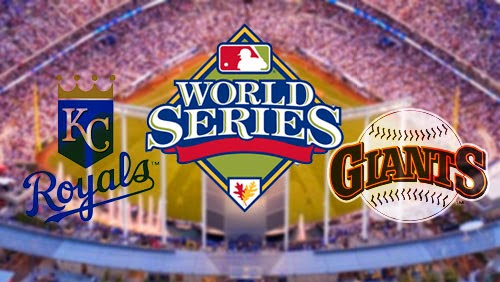
From 1903 to 1968, there were only two teams in the postseason. The pennant winners of the AL and NL played in the World Series. Expansion prompted an increase to four teams in the post season, and later to eight, then 10, and now 12. It’s not going back. Each increase in teams and games means more TV money.
It also means 12 different fan bases get energized for the playoffs. Many of them will stick around even after their team loses.
MLB is just catching up to what the NHL, NBA and NFL have been doing for years (and for the same reasons, TV money and postseason excitement). MLB now has 12 of its 30 teams in the postseason. The NHL, 16 of 32. The NBA, 16 of 30. The NFL, 14 of 32.
So some small market teams (e.g., the Royals) will sometimes get a shot. But not often. Even this year’s “underdogs” were in the upper tier of team payrolls.

Seattle Stories: Although the Astros swept Seattle 3-0, every game was close.
In Game 1, the Mariners led 7-3 after seven innings. The Astros scored two to in the 8th to make it 7-5, and then had two men on and two out in the 9th. Seattle manager Scott Servais brought in a reliever to get the last out. Correction: Servais brought in a starter (Robbie Ray) to get the save. Ray has pitched in 225 games in his career, 221 as a starter and four in relief. He has never recorded a save.
The decision by the manager was clearly in violation of the DENNIS LEONARD RULE! This rule has haunted me since 1977. I’ll explain why below, but simply stated, the rule is that you don’t bring in a starter to get a save in the postseason. They are not programmed for that. And the postseason is a poor time to experiment. When Robbie Ray came in, I said “Dennis Leonard” out loud to Rita. Then Houston’s Yordan Alvarez stepped up to the plate and blasted a 3-run walk-off homer to win the game for the Astros.
The Mariners also developed a lead in the second game, 2-1 after five innings. Then Yordan Alvarez came to the plate. Bam. Two-run homer. Final score, 4-2.
Game 3 was about as close as you could get:

About an hour before game time, I got an email from KC native David Matson who now lives in Portland. He was in Seattle for the game and sent this photo.
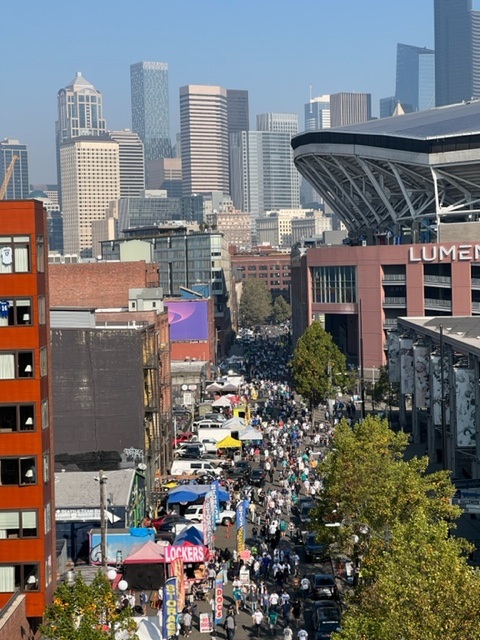
For the first seven scoreless innings, Rita and I watched the game in our TV room at home. We then left with our Townsend Place neighbors Irv and Sharyn Blond for a 5:45 dinner at Ragazza. We settled in with an appetizer (the eggplant fries), wine, salads, entrees and dessert. The swordfish was sublime. A two-hour leisurely dinner. I checked in on the game on my phone a couple of times. Still no runs.
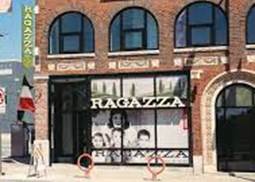
We left Ragazza about the 13th inning and went home to watch the rest of the game. In the 14th, David Matson sent another photo. Said the crowd was having a second 7th inning stretch.
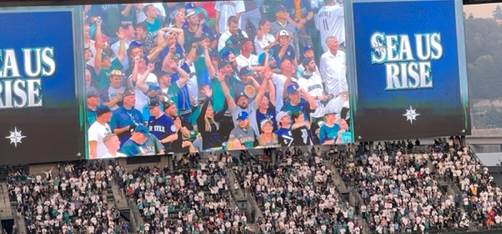
Twitter was busy with people watching the drama. About the 15th inning…
MLB Jesus was rooting for Seattle and it’s superstar rookie Julio Rodriguez.


About the 16th inning, with a tweet message saying “Sorry, couldn’t help myself”…

About the 17th inning…

After 17 scoreless innings, Houston’s Jeremy Pena hit a solo homer in the top of the 18th. Seattle did not score in the bottom of the 18th. Final, 1-0. Game time – 6:22.
To the credit of the Seattle fans, they didn’t leave the stadium after the last out. They stood and cheered “Let’s Go Mariners.” Clip here.
After that game, we switched channels to watch the last three innings of the Cleveland/New York game that was won in the 9th by the Guardiac Kids. Quite a nice night of baseball. And swordfish.
The Goose and Goose Eggs: The Houston/Seattle 17-inning scoreless streak was a new record. The “old” record of 14 was set just a week before in a Wild Card game between Tampa Bay and Cleveland (box score below). So in 120 years of postseason play, the two longest scoreless games occurred this month. The prior record was 12 innings.

With all the goose egg records, it was only appropriate that a goose got national attention in the postseason. In Game 2 of the NLDS series between San Diego and Los Angeles, a goose took up residence in short right field. The Dodgers Gavin Lux was at the plate. The goose stayed in place (video here). After Lux singled, the goose was chased down and released outside the stadium.
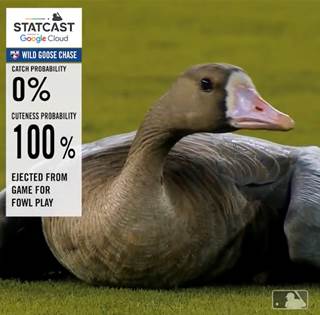
Royals Trivia (1) – Wil Myers/Eric Hosmer: Wil Myers was signed by the Royals in 2009 and played in their minor league system from 2009 to 2012. He was a strong prospect, but he was a first baseman and blocked by Eric Hosmer at the major league level. He was traded to Tampa Bay in the winter of 2012 in the multi-player deal that brought Wade Davis and James Shields to the Royals (both key to the Royals getting to the World Series in 2014; thank you Wil). Myers was AL Rookie of the Year with the Rays in 2013. He was traded to the San Diego Padres in 2015.
He was the primary first baseman for the Padres in 2016 and 2017, but then lost the position to free agent Eric Hosmer who signed with the Padres in 2018. Myers was then mostly used as an outfielder and designated hitter, but added back some first base work early this year when Hosmer was traded to Boston. Myers has been the Padres first baseman in all but one game of the postseason.
Remember how Eric Hosmer celebrated the 2015 World Series victory by buying drinks for Kansas City fans at the Power and Light District? Check out this clip of Wil Meyers and his wife doing this after the Padres Wild Card series win in San Diego.
Below, Myers and Hosmer after hitting back-to-back home runs on opening day of 2021.
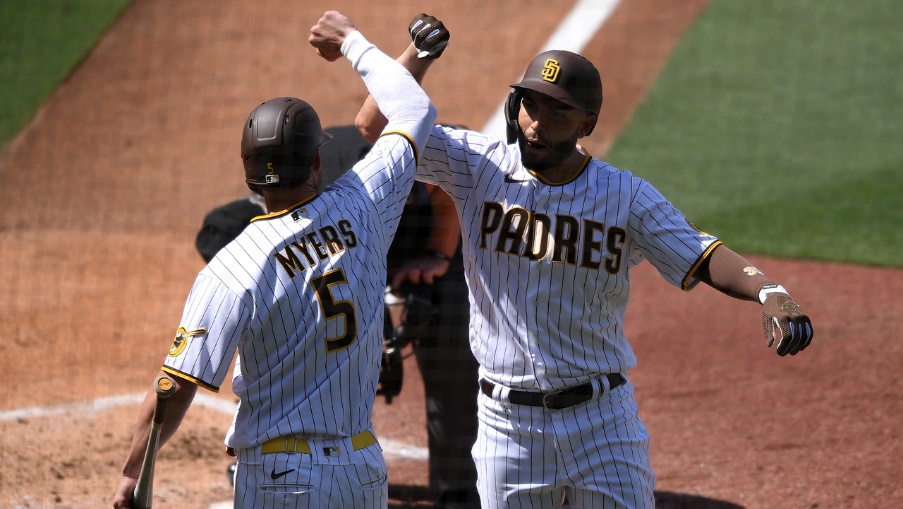
Royals Trivia (2) – Dennis Leonard Rule: The Kansas City Royals joined the American League as an expansion team in 1969. Owner Ewing Kauffman quickly built a solid team that won the Western division in the American League in 1976, 1977 and 1978. In each of those three years, the Royals then lost the ALCS to the damn Yankees. My horror story relates to 1977.
The ALCS was then a best-of-five round. The Yankees and Royals split the first four games and were in Kansas City for the final game. I was there with my friend Albert Riederer (RIP). Albert and I met while working on political campaigns, and in 1978, he ran successfully for the county legislature, followed by three terms as Jackson County prosecutor. We acquired our tickets through the lottery process, relegating us to near the back row of the upper deck. Yes, I still have my ticket stub.
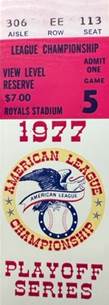
The Royals led 3-2 after eight innings. To go for the win, manager Whitey Herzog called on Dennis Leonard to pitch the ninth. As a starting pitcher in 1977, Leonard had won 20 games. He had appeared in relief one time and got a save – what I would call a small sample size for being a stopper in a late inning game of extreme pressure. Whitey’s experiment did not work. Leonard faced two batters, giving up a single and a walk. Whitey replaced him, and Leonard’s two runners became the tying and go-ahead runs.
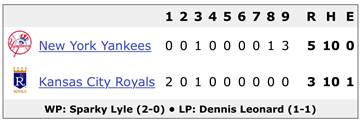
I remember the quiet that fell over the stadium. From the time Albert and I left our nosebleed seats until we reached the car, you could hear a pin drop.
I immediately formulated my own personal “Dennis Leonard Rule” for the baseball postseason. Starters should not be called upon to be stoppers. They are accustomed to a certain rhythm that carries them through several innings, not the punchout at the end. I don’t have any stats to prove if I’m right or wrong. But I can’t erase from my brain that Game 5 in 1977.
This is not meant to be negative about Dennis Leonard. He did not make the relief pitcher choice. Leonard won 58 games in 1976, 1977 and 1978 when the Royals won three straight Western Division championships. In his twelve seasons with the Royals, Leonard won 144 games and had one save. He was enshrined in the Royals Hall of Fame in 1989.
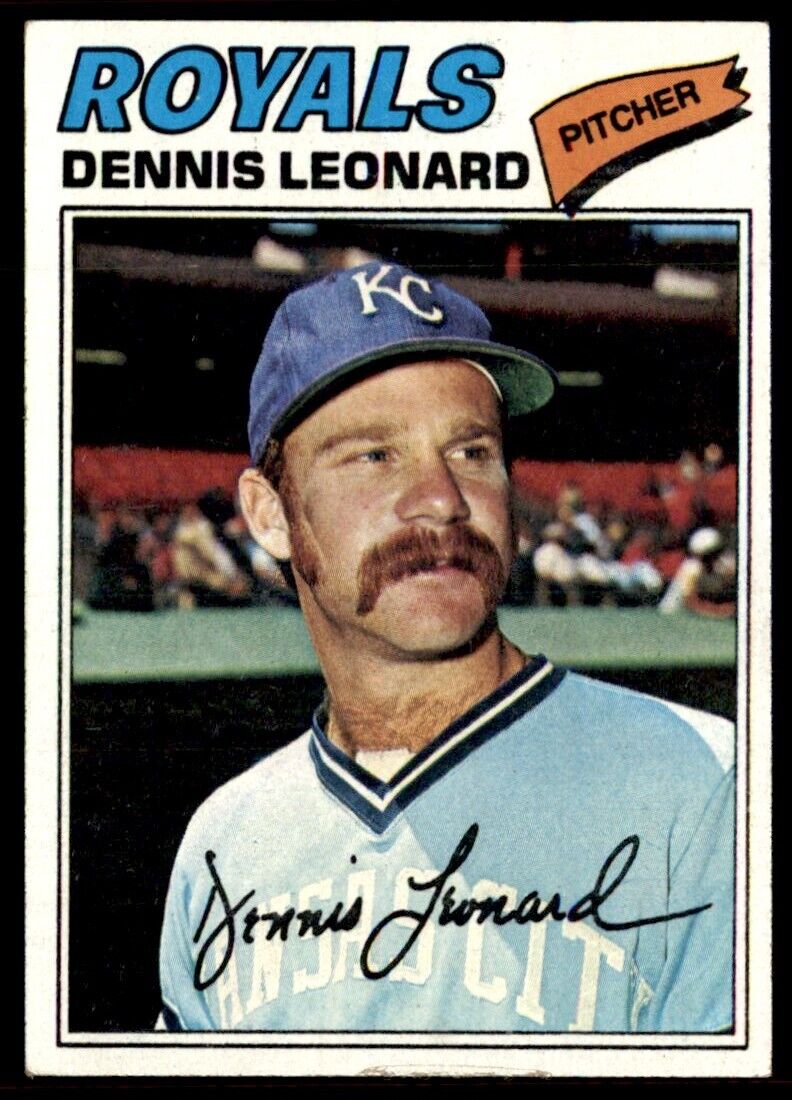
Lonnie’s Jukebox – 1977 Edition: Moving on to something more enjoyable than the result of the 1977 ALCS, let’s take a look at some of the rock ‘n’ roll music of that year.
“Tonight’s the Night” by Rod Stewart.
“Night Moves” by Bob Seger.
“Don’t Stop” by Fleetwood Mac. This is one of the four top-ten hits of 1977 that came from the blockbuster album Rumours. “Don’t Stop” gained new life in 1992 when it became the song of the Bill Clinton presidential campaign. After he was elected, Clinton convinced the group to reunite for one night to sing at his Inaugural Gala. Below, Clinton being welcomed to the stage by Stevie Nicks. Personal note: Rita and I were there.
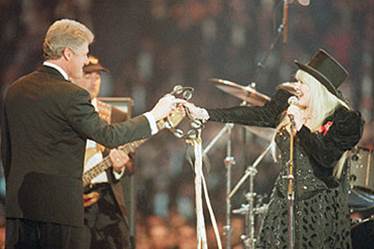
“Margaritaville” by Jimmy Buffett.
“Nobody Does It Better” by Carly Simon. Theme for the James Bond movie The Spy Who Loved Me.
“Dancing Queen” by ABBA.